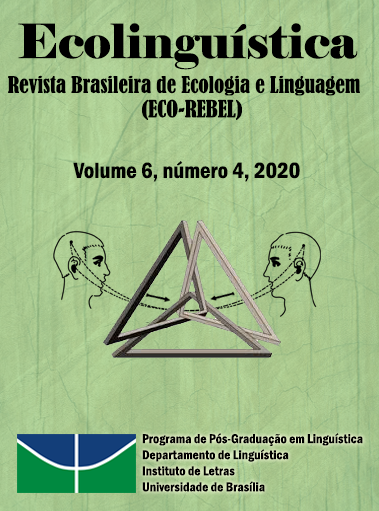Pandemic possibilities for applied linguists’ actions
Keywords:
Applied linguists; zoonotic pandemics; Sustainable Development Goals; Anthropocene; environmental education; reducitarianismAbstract
This article challenges applied linguists and other academics to think and act outside of the box to help society confront COVID-19, future pandemics, and other crises that humans and other earthling currently face and that lie on the horizon. These outside-the-box actions by applied linguists can involve not only the research we do but also the ways we share our work and how we teach our students. Nine examples of such actions are provided, and readers are urged to collaborate in this crucial work.
Downloads
References
ADAMS, C. J.; BREITMAN, P.; MESSINA, V. Even vegans die. Lantern, 2017.
CARRINGTON, D. Earth’s sixth mass extinction event already underway, scientists warn. The Guardian. 2017, July 10.
CARRINGTON, D. Why you should go animal-free. The Guardian. 2020, June 19.
CHAU, M. H.; JACOBS, G. M. (manuscript submitted for publication). Controversy in language guidelines and practices.
CHAU, M. H.; ZHU, C. H.; JACOBS, G. M.; DELANTE, N.; ASMI, A.; HUANG, L.-F.; NG, S.; JOHN, S. S.; GUO, Q; MAN, D.; SHUNMUGAM, K. (manuscript submitted for publication). Applied linguistics and the sustainable development goals: the case of media attention to basic human needs and covid-19.
DE WAAL, F. Are we smart enough to know how smart other animals are? W.W. Norton, 2016.
Fairclough, N. Critical discourse analysis: The critical study of language (2nd ed.). Routledge, 2013.
GILQUIN, G., & JACOBS, G. M. (2006). Elephants who marry mice are very unusual: The use of the relative pronoun who with nonhuman animals. Society & Animals v. 14, n. 1, 2006, p. 79-105.
https://www.animalsandsociety.org/wp-content/uploads/2016/04/gilquin.pdf
GREGER, M. (2020). How to survive a pandemic. Bluebird. IBÁÑEZ, M. B.; GARCÃA RUEDA, J. J.; MAROTO, D.; & KLOOS, C. D. (2013). Collaborative learning in multi-user virtual environments. Journal of Network and Computer Applications v. 36, n. 6, 2013, p. 1566-1576.
JACOBS, G. M. [Review of the book Are we smart enough to know how smart animals are? by Frans de Waal 2017], 2017a. Retrieved from
https://www.facebook.com/humananimalstudiesnewzealand/posts/1411583718880939 JACOBS, G. M. [Review of the book Even vegans die, by C. J. Adams, P. Breitman, & V. Messina]. [blog post], 2017b, June 6. Retrieved from http://animalallies.sg/blog/
JACOBS, G. M. How to be an engaged intellectual. Journal of Modern Languages, 29, 2019, p. 126-146. https://doi.org/10.22452/jml.vol29no1.6
JACOBS, G. M., & DILLON, D. Promoting critical literacy: The case of promotional materials for burgers. ECO-REBEL, v. 5, n. 1, 2019, p. 16-27.
JACOBS, G. M.; FONG, S. J. (2020). Perspectives on a 2019 tiger-human interaction incident in Malaysia. ECO-REBEL V. 6, N. 1, 2020, P. 41-51. Retrieved from https://periodicos.unb.br/index.php/erbel/article/view/29896
JACOBS, G. M.; Goatly, A. Ecological issues in ELT coursebooks. ELT Journal 54, 2000, p. 256-264.
JACOBS, G. M.; GRELICHE, N. (2017). Convincing students that their groupmates’ success can increase, not diminish, their own success. Insight: A Journal of Scholarly Teaching, 12, 2017, p. 145-157. JACOBS, G. M., JOYCE, M. J.; SUBRAMANIAM, J. The presence of food in English as an additional language textbooks. (ERIC Document Reproduction Service No. ED ED585231), 2018. https://files.eric.ed.gov/fulltext/ED585231.pdf JACOBS, G. M; G. M., KIMURA, H.; GRELICHE, N. (2016). Incivility among group mates in English classes at a Japanese women’s university. TESL-EJ, v. 19, n. 4, 2016, p. 1-16. http://www.tesl-ej.org/pdf/ej76/a6.pdf
JACOBS, G. M.; LEWIS, P. Commentary: Add more plants, and less meat to your meals. Here’s why. Channel News Asia, 20128, November 25.
JACOBS, G. M.; TAN, H. S.; TEH, J. X. (2018). The acceptance of virtual presentations at International conferences on education. ECO-REBEL v. 4, n. 2, p. 49-64. Retrieved from https://periodicos.unb.br/index.php/erbel/article/view/12360
JACOBS, G. M.; TEH, J. X.; JOYCE, M. J. The presentation of animals in English as an additional language coursebooks. Language & Ecology 2016.
https://files.eric.ed.gov/fulltext/ED574076.pdf JOHNSON, D. W.; JOHNSON, R. T.; STANNE, M. B. Cooperative learning methods: A meta-analysis. University of Minnesota, 2000.
Klöckner, C. A. The psychology of pro-environmental communication: Beyond standard information strategies. Palgrave, 2015.
LIE, A.; JACOBS, G. M.; AMY, S. (Eds.). English via environmental education. Grasindo. National Geographic. (2020). 2002. Anthropocene.
https://www.nationalgeographic.org/encyclopedia/anthropocene/
NPR. UN warns number of people starving to death could double amid pandemic. (2020, May 5).
SHAPIRO, P. (2018). Clean meat: How growing meat without animals will revolutionize dinner and the world. Simon & Schuster.
Slavin, R. Synthesis of research on cooperative learning. Educational Leadership v. 48, n. 5, 1991, p. 71-82.
STIBBE, A. Ecolinguistics: Language, ecology, and the stories we live by. Routledge, 2015.
UNESCO”“UNEP. (1976). The Belgrade Charter: A global framework for environmental education. Connect, v. 1 n. 1, 1976, p. 1”“9.
United Nations. (2020). Sustainable development goals. 2020.
https://www.un.org/sustainabledevelopment/sustainable-development-goals/
VAN RYZIN, M. J.; ROSETH, C. J.; BIGLAN, A. Mediators of effects of cooperative learning on prosocial behavior in middle school. International Journal of Applied Positive Psychology v. 5, 2020, p. 37-52.
WORLDOMETER. COVID-19 coronavirus pandemic. (2020, November 1).
Downloads
Published
How to Cite
Issue
Section
License
Copyright (c) 2020 Ecolinguística: Revista brasileira de ecologia e linguagem (ECO-REBEL)

This work is licensed under a Creative Commons Attribution-NonCommercial-NoDerivatives 4.0 International License.
Authors who publish in this journal agree to the following terms:
Authors retain copyright and grant the journal the right of first publication. The work is simultaneously licensed under the Creative Commons Attribution License allowing the sharing of the work with acknowledgment of the authorship of the work and initial publication in this journal.
Authors are authorized to enter into additional contracts separately for non-exclusive distribution of the version of the work published in this journal (e.g., publishing in institutional repositories or as book chapters), with acknowledgment of authorship and initial publication in this journal.
Authors are allowed and encouraged to post and distribute their work online (e.g., in institutional repositories or on their personal page) at any point before or during the editorial process, as this can bring about productive revisions as well as increase impact.
Citation of published works (See The Effect of Free Access).



3.png)



